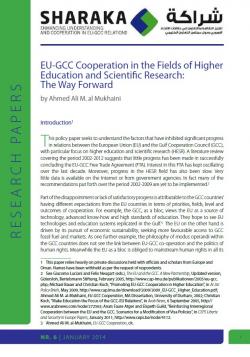EU-GCC Cooperation in the Fields of Higher Education and Scientific Research: The Way Forward
This policy paper seeks to understand the factors that have inhibited significant progress in relations between the European Union (EU) and the Gulf Cooperation Council (GCC), with particular focus on higher education and scientific research (HESR). Based on informal discussions held with opinion leaders and government officials in Oman as well as insights from meetings and discussions held in Brussels in 2011 with representatives of the EU Commission, European Parliament and NGOs, the paper outlines and discusses the factors responsible for the lack of progress in the cooperation. These factors can be classified into four categories: structural/ institutional challenges; political challenges; philosophical challenges; and logistical challenges. Based on the assumption that progress in economic development and scientific research is highly dependent on progress in higher education, as higher education builds up human capital, the paper argues that cooperation in higher education should be the locomotive leading the way for a greater engagement between the EU and the GCC. Furthermore, as the EU's own experience suggests, cooperation in higher education is highly conducive to integration, stability and economic growth, all of which are valid concerns for the EU and GCC alike, and constitutes an area in which the two blocs can develop a greater sense of complementarity.
-
Details
Roma, Istituto affari internazionali, 2014, 29 p. -
In:
-
Issue
Research Paper 6
Introduction
1. Status Quo
2. Top HE Destinations for GCC
3. Tertiary Education in the GCC and EU
4. Areas of Joint Scientific Research
5. Higher Education and Scientific Research in the EU-GCC Jap and Related Activities
5.1. EU–GCC Clean Energy Network
5.2. EU-GCC INCONET
6. Challenges to EU-GCC Cooperation in HESR
6.1. Structural and institutional challenges
6.2. Philosophical and cultural challenges
6.3. Political challenges
6.4. Logistical challenges
7. Why Focus on Higher Education and Scientific Research Now? Some Turning Points
8. Policy Recommendations
8.1. Short to mid term: small steps, large impacts
8.2. Long term: joint EU-GCC Helsinki process for GCC higher education
References
Annex
Topic
Tag
Related content
-
Ricerca27/12/2013
SHARAKA - Enhancing Understanding and Cooperation in EU-GCC Relations
leggi tutto



